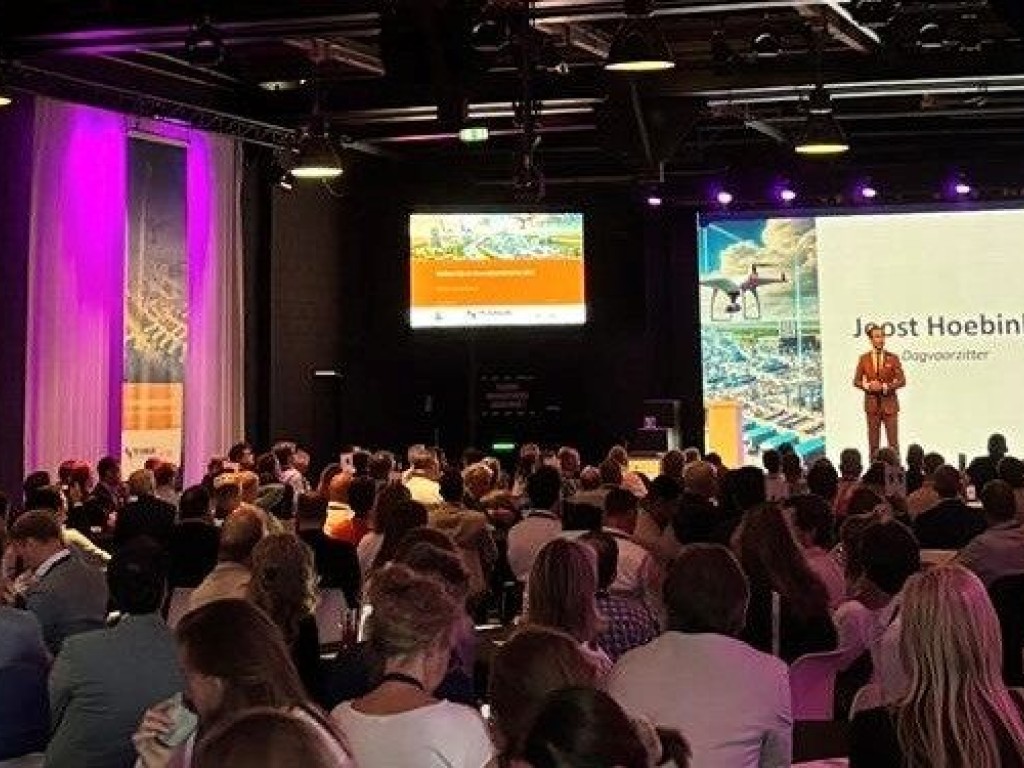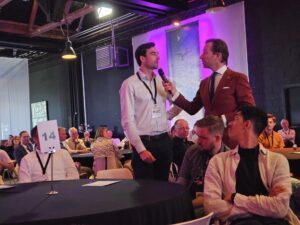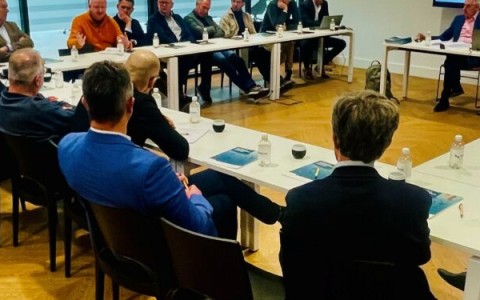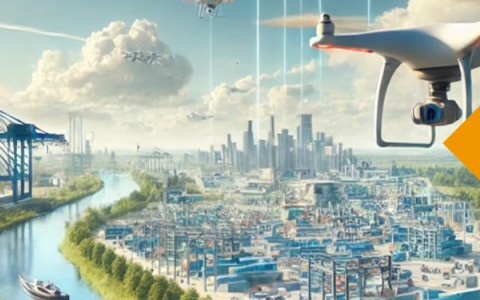Innovation Conference 2025: "Logistics is an enabler of societal transitions"

On 20 May 2025, the Logistics Innovation Conference took place at the Rijtuigenloods in Amersfoort, with some 270 participants from business, government and science. The conference, organised by TKI Dinalog, Top Sector Logistics and Netherlands Organisation for Scientific Research (NWO), revolved around innovation and cooperation. Ronald Paul of Top Sector Logistics: "The value of the sector to welfare and prosperity is still underestimated."
"We are already leading the way in the Netherlands, and today is about how we can move forward even further as an industry," opened day chairman Joost Hoebink. "So how do we arrive at even more sustainable and efficient solutions?" He gave the floor to Ronald Paul, figurehead of the Top Sector Logistics and working for the Rotterdam Port Authority for many years. "Previously, I worked on the accessibility of the port of Rotterdam. I think it's great to be able to do this for the whole of the Netherlands now."
According to Paul, the importance of logistics to welfare and prosperity is still under-recognised. "Maybe we as a sector should lay off work for two days once," he joked. This was followed by a serious appeal: investigate how to spread the work differently, for example by anticipating the closure of the Van Brienenoord Bridge to freight traffic now. Paul also called for more attention to the resilience of organisations against, for example, cyber attacks or natural disasters.
Logistics as an 'enabler' of transitions
 Tijdens het plenaire deel introduceerden Niels Agatz (TKI Dinalog en RSM) en Iris Vis (Captain of Science Topsector Logistiek en RUG) twee stellingen over de toekomst van de sector.
Tijdens het plenaire deel introduceerden Niels Agatz (TKI Dinalog en RSM) en Iris Vis (Captain of Science Topsector Logistiek en RUG) twee stellingen over de toekomst van de sector.
Agatz explained how the National Knowledge Agenda on Logistics came about: "We collected what the big challenges are for policy, companies and knowledge institutions." Vis stressed that logistics is everywhere: "That is why the sector is an 'enabler' of the transitions we face as a society."
The participants, who were spread across several tables, engaged in animated discussions. You have to dare to take more risks as a researcher to achieve real innovation, was the core of the proposition introduced by Agatz. "Making mistakes is the most instructive thing," one of the tables heard. At the same time, risk-taking is still proving difficult in practice: "Often the objectives are already too fixed in projects," said another. The desire to leave more room for radical innovation was widely shared.
Sub-sessions after lunch allowed visitors to delve into topics such as logistics in healthcare and the impact of AI. Because the sector cannot ignore artificial intelligence, it became clear. During the session 'AI impact on supply chains', several innovative projects were given a stage, from smarter inventory management to reducing food waste in strawberry transportation.
How resilient is the sector?
The resilience of the sector, think cyber attacks or natural disasters, was also discussed at length. "More than half of the companies have faced a serious disruption," said Ronald de Boer (Windesheim University of Applied Sciences). He presented the project Next Gen Resilience, which has developed a tool to help companies assess and increase their resilience.
De Boer made a strong pitch on this project earlier in the day. Indeed, Next Gen Resilience was one of the four nominees for the TKI Dinalog Impact Award, which was presented for the first time this year. In a pitch of just two minutes, the finalists had the chance to convince the audience. The jury and the number of votes together determined who could take home the coveted trophy. Only just before the drinks, after loud drum roll, the winner was announced.

DynaPlex wins Impact Award
In the end, the project DynaPlex walked away with the prize. The winning pitch came from Martijn Mes (University of Twente). Inspired by major breakthroughs with AI in the field of board games, those involved wanted to translate these possibilities into logistics puzzles. With 14 concrete practical examples, the added value of this tool was amply demonstrated. "I am standing here on stage now, but this has really been a team effort," he said referring to the collaboration with TU Eindhoven and numerous companies. "Together we are bridging the gap between leading AI and concrete applications in logistics."
Click here for all the presentations of the various sessions
Written by Karst Oosterhuis.


